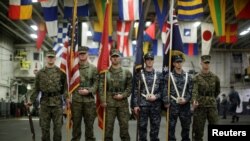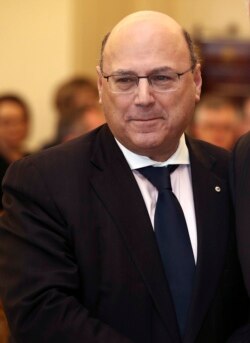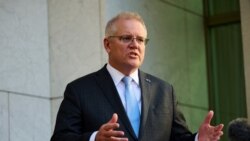Australian Ambassador Arthur Sinodinos' bid to raise his country's profile in Washington has gotten a boost: Several prominent analysts are arguing that Canberra deserves more appreciation from Americans for its role on the front line of the West's growing strategic and economic rivalry with China.
Australia is "prepared to stand up for" the values it shares with America and its allies in "a whole series of ways," Sinodinos said during a virtual forum last week to mark the launch of an Australian Chair at the Center for Strategic and International Studies in Washington.
"While we look to the U.S., we don't leave it to the U.S.," he said. "As allies, we're prepared to pull our weight in all of this and do what's required in the interesting times ahead."
Several American participants in the event agreed with Sinodinos and said his country deserves more credit than it gets.
Australia is "the frontline state" in countering Chinese economic and political aggression, said Kori Schake, a former U.S. foreign policy and defense official who is now a senior fellow and director at the American Enterprise Institute, another Washington think tank.
"They have taken the lead on making a number of difficult decisions, even when they had to do it alone," Schake said, adding that Australia was the first country to identify the dangers of permitting Chinese state-backed tech giant Huawei to become an essential component of communications networks in free societies.
In as early as April 2020, Australian Prime Minister Scott Morrison called for an independent international probe into the origins of the coronavirus, a call he repeated months later while addressing the U.N. General Assembly.
Beijing interpreted these statements as attacks and launched a series of punitive measures against Canberra, along with "wave after wave" of cyberattacks, according to Bloomberg.
An 'underappreciated' ally
Americans need to be more aware of "just how exposed our close ally Australia is, and what more we can be doing together to set an example on how to strengthen countries that stand up for their values, stand up for their interests, as well as the rules of the international order," Schake said.
CSIS President John Hamre sounded a similar note, describing Australia as "probably the most underappreciated important ally in our orbit."
"Australia has consistently been with the United States in anything that ever mattered, but Americans don't know enough about the country," he said. "We tend to think about Australia as a distant land with alligator wrestling and strange-looking animals. Australia is a far more sophisticated country than that, and we should spend more time listening to what our friends in Australia can tell us."
James Carouso, a former deputy chief of mission and charge d'affaires at the U.S. embassy in Canberra, thinks Americans have some distance to go before their appreciation for Australia matches Aussies' appreciation for Americans.
"Australia remembers World War II, the Battle of the Coral Sea, the United States coming to help Australia defend against Japanese invasion. They still remember it and commemorate it," Carouso said.
"That's not done here," he continued, suggesting that most Americans have a vague sense of Australia as a "good friend, far away."
Basking in the wave of unaccustomed appreciation, Sinodinos modestly suggested that his country is acting in its own interests as much as America's, even if those interests are often the same.
"We're pragmatists," he said. "The decisions we've taken, whether it's on Huawei, on the origin of COVID, countering foreign interference in political and administrative systems, those issues have been dictated by our circumstances. But they've been underpinned by our values and interests, and our view that our sovereignty should not be compromised."
"If that's been an example to others, that's terrific, that's important," the envoy said.
Importance of AUKUS
The nuclear submarines featured in AUKUS — the recently announced defense agreement among Australia, the United States and Britain — are "very glamorous" and "have attracted a lot of attention," Sinodinos said. But, he added, "AUKUS is more than just the subs.'"
"This trilateral cooperation is not just about specific capabilities but how we work together," including not just government-to-government relations but also making full use of each other's industrial and technological bases, Sinodinos said.
"The trilateral cooperation coming out of it is, I think, going to be its great legacy," he said.
The future importance of the relationship between the United States and Australia was stressed by Kurt Campbell, coordinator for Indo-Pacific affairs on the National Security Council, who said the alliance "has ascended to the very, very top, highest level."
"Everything we'll do with consequence, we'll do with Australia," said Campbell, a former assistant secretary of state in the Obama administration. He credited Canberra for its leadership role in the Indo-Pacific region and said Washington could do a better job of "deputy sheriff" when it comes to a number of initiatives in the region.
Charles Edel, holder of the new Australia Chair at CSIS, said the rapid increase in American attention to Australia owes much to its role as a "bellwether" in dealings with Beijing. "They're the first to experience a range of coercive measures from China, and in many areas they're the first to respond," he said.
In a written exchange of questions and answers with VOA, Edel echoed Campbell and Sinodinos in calling for closer economic and trade collaboration between the two allies. "Any serious strategy for the Indo-Pacific region must pay as much attention to economic engagement as it does to security concerns," he wrote.
He called for progress in ensuring that U.S. defense export control measures facilitate, not hinder, research and development collaboration among the U.S., Canada, Australia and Britain.
"For AUKUS and other things to happen, this will be key," Edel told VOA.






